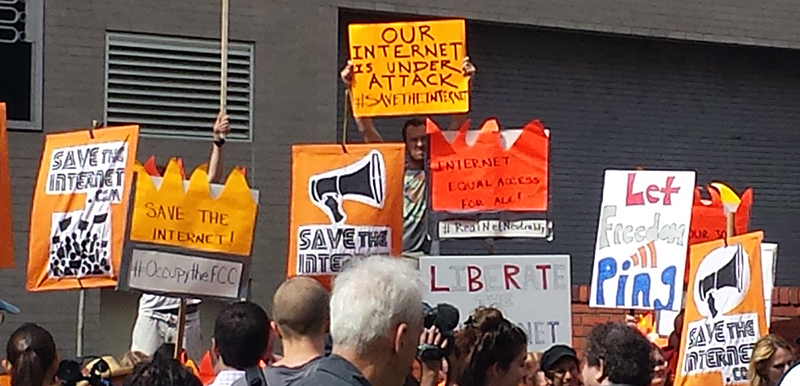Pro-ISP Bill To Block FCC From Using Title II For Internet Introduced In Congress
 Lawmakers have been happy to opine about the net neutrality fight since the old rule got tossed out a year ago. Now that the FCC is not only set to vote on a new proposal next month, but also likely to take the Title II approach in that proposal, the window is closing for Congress to act, and lawmakers are feeling the urgency. And that is how we find ourselves once again with a bill on the floor seeking to remove the FCC’s authority to classify broadband how it sees fit.
Lawmakers have been happy to opine about the net neutrality fight since the old rule got tossed out a year ago. Now that the FCC is not only set to vote on a new proposal next month, but also likely to take the Title II approach in that proposal, the window is closing for Congress to act, and lawmakers are feeling the urgency. And that is how we find ourselves once again with a bill on the floor seeking to remove the FCC’s authority to classify broadband how it sees fit.
The bill in question, HR 279, doesn’t so much have a catchy name as a lengthy descriptor: “To amend the Communications Act of 1934 to limit the authority of the Federal Communications Commission over providers of broadband Internet access service.”
The bill seeks to do exactly what it says: it would forbid the FCC from classifying broadband services as telecommunications services, which are regulated under Title II of the Communications Act, and would instead force internet services to remain classified as they currently are, as information services.
The difference between the FCC’s regulatory scope over information and telecommunications is basically where the whole mess began. If the FCC moves to reclassify broadband services as communications, and not as information, then broadband services can be regulated under Title II of the law and can be made subject to the same non-discrimination, common carrier regulations as other utilities.
Rep. Bob Latta of Ohio introduced the bill, which is co-sponsored by Reps. Walter Jones (NC), Charlie Rangel (NY), and Randy Weber (TX). In a press release, Latta hailed the bill as “bipartisan legislation to ensure the internet remains open and free” before repeating the ISPs talking points about Title II being anachronistic 20th century “monopoly-era telephone rules” that would stifle innovation, dynamism, and progress.
As Ars Technica and others have pointed out, Rep. Latta has received a significant amount of campaign funding from the major ISPs and their trade (lobbying) groups. In the leadup to the 2014 election, that included $15,000 from the NCTA, $13,000 from AT&T, $10,000 from Time Warner Cable, $8500 from Comcast, and $8000 from Verizon, among others.
This is the second time Latta has put forth this proposed amendment to the Communications Act. The previous version went to Committee in May, 2014 and was never heard from again. At the time, the FCC was not leaning toward the Title II approach and there were months yet to go in the proceeding’s pleading process, so lawmakers focused their attention on other things.
However, Congressional interest in net neutrality and the FCC surged around the holidays, after President Obama very publicly called for the Title II approach. The response was instant, political, and predictable, with a tidal wave of mostly-Republican Representatives and Senators showing up to oppose the move.
With the new Congress sworn in and an actual date for the vote on the FCC’s calendar, it’s now-or-never for the opposition. Wheeler will be circulating the new proposal among the other commissioners’ offices on February 5, and the FCC is scheduled to vote on it on February 26.
Want more consumer news? Visit our parent organization, Consumer Reports, for the latest on scams, recalls, and other consumer issues.

